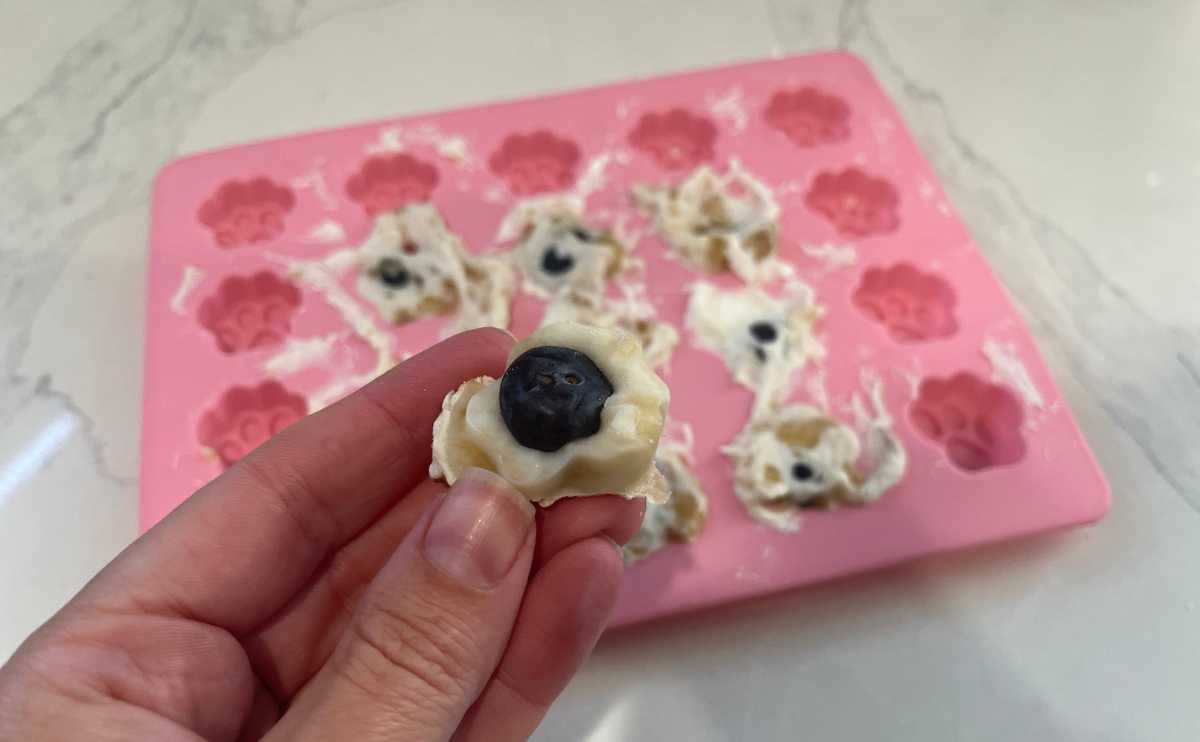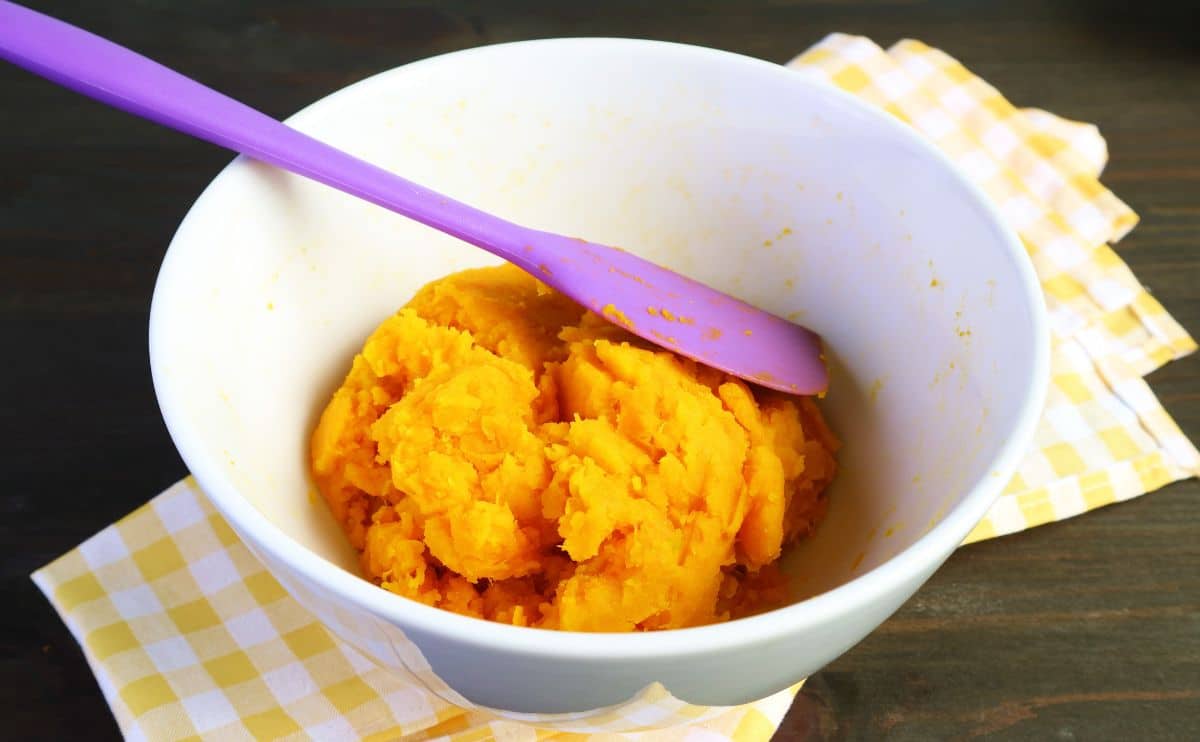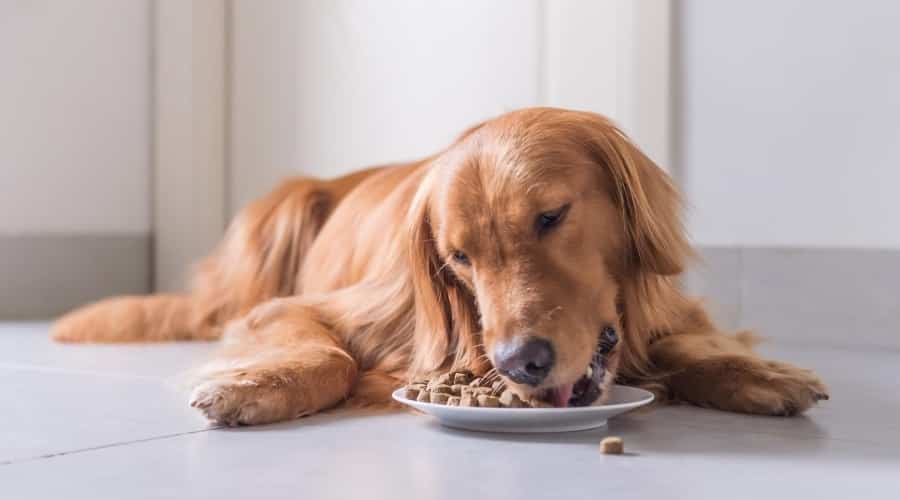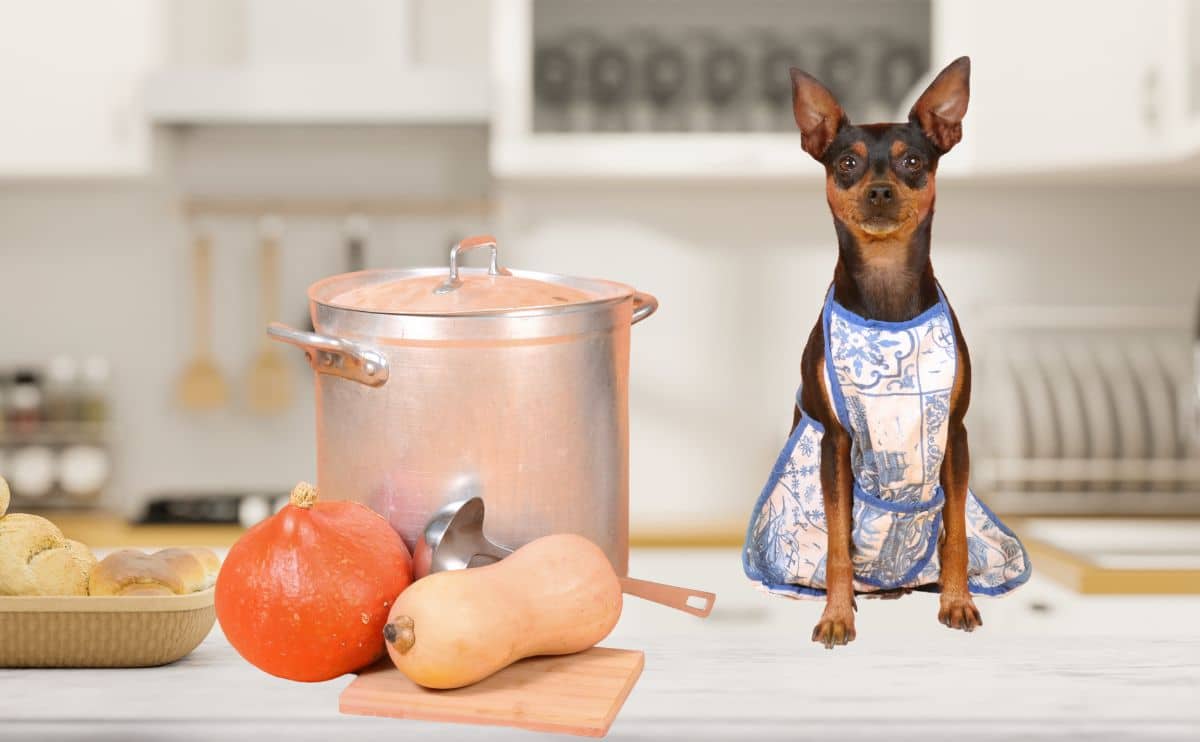20 Fruits And Vegetables Dogs Can’t Eat
When you purchase through links on our site, we may earn a commission. Here’s how it works.
Although we think of dogs as carnivores, they are scavengers by nature. Dogs supplement their diets by eating other things, including fruit and vegetables. This is a good way for dogs to get additional vitamins and fiber. Plus, some fruit and vegetables make excellent low-calorie treats. However, not all fruits and veggies are safe for your pup to eat. Before adding anything to your pup’s bowl. learn about these 20 fruits and vegetables dogs can’t eat from veterinarian Rebecca MacMillan.
Table of Contents
20 Fruits And Vegetables Dogs Can’t Eat
The following fruits and vegetables are not safe for dogs to eat. It’s a good idea to keep this list to be sure you never give your pup fruits or veggies dogs can’t eat. All the produce and veggies listed below are not safe to feed your sweet pup.
1. Avocado Pits
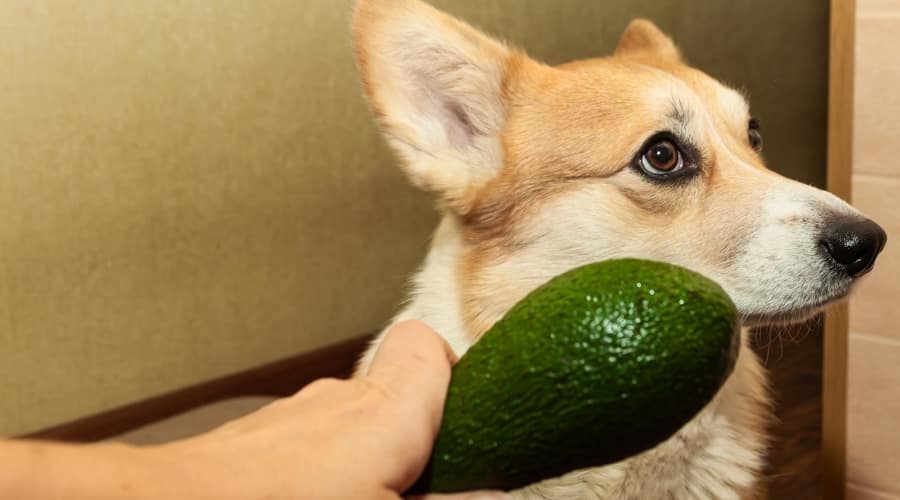
While the actual flesh of the avocado is safe to eat, you need to stop your dog from getting anywhere near the pit. If they accidentally swallow this large seed, it will cause a blockage. The pit is undigestible, and due to its large size, it will not usually pass through. Obstructions can require abdominal surgery to correct, so avoid any risk by keeping your dog away from avocados.
The pit also contains persin, which can be toxic to some other species but not dogs. Another word of caution: while the flesh is non-toxic, it does contain high levels of fat, which can trigger episodes of pancreatitis in susceptible dogs and may lead to unwanted weight gain.
2. Chili Peppers
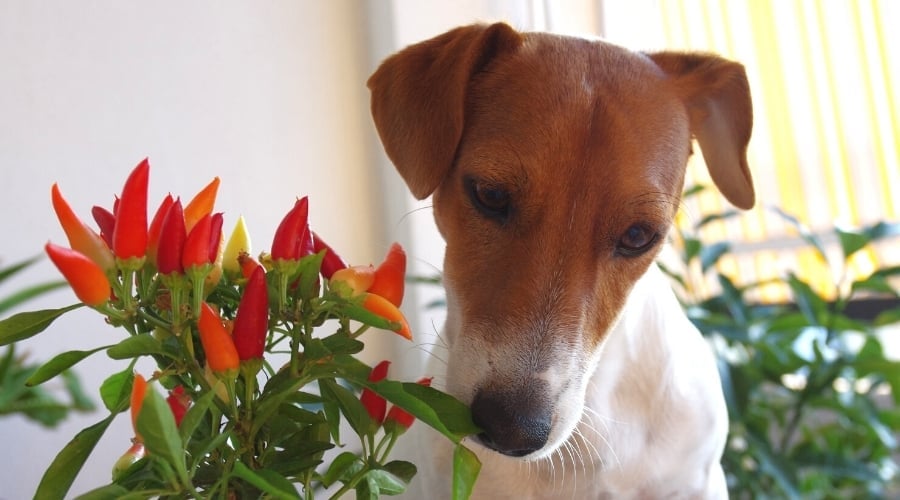
While chili peppers won’t be toxic to dogs, they contain capsaicin, something that is irritating to your dog’s stomach. They may start showing signs of tummy upset with vomiting and diarrhea. You should avoid feeding these to your dog or giving your dog any spicy leftovers that contain them. They won’t add much nutritionally to your pet and could cause a lot of discomfort.
3. Chives
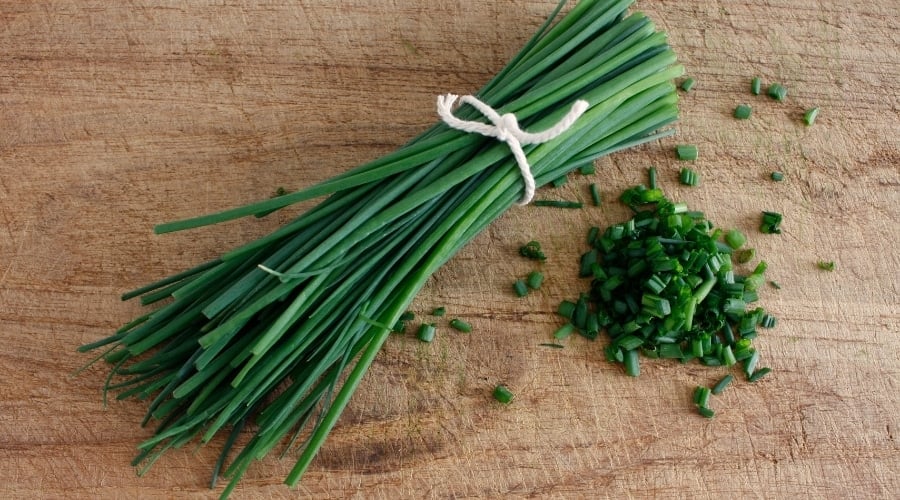
A member of the allium family, chives are also plants that are toxic to dogs. Chives can cause hemolytic anemia, a condition that affects the red blood cells causing them to become damaged. The broken red blood cells can no longer carry oxygen around the body, leading to weakness and other side effects such as an elevated heart rate, paleness of the gums, and collapse. Do not allow your dog to eat chives or feed them any leftovers that might contain them.
4. Corn On The Cob
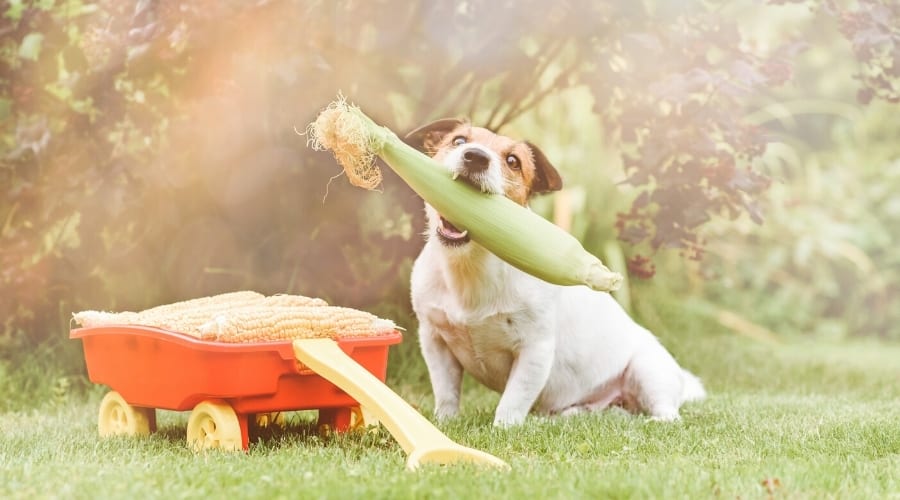
While sweet corn itself is not toxic to dogs, many people eat it like corn on the cob, which could be an issue for dogs. If your dog eats corn on the cob, he could get a blockage in his stomach or intestines if he swallows it whole or a large chunk of it. Dogs with obstructions can have vomiting and lack of appetite and usually require surgery to correct. If your dog does eat corn on the cob, it is best to ring your vet.
Most dogs are not dainty eaters, and instead of nibbling the sweetcorn off, they will actually just eat the whole cob. It’s not worth the risk so avoid giving these to your dog and dispose of any corn on the cobs safely in the trash when attending BBQs or family events.
5. Garlic
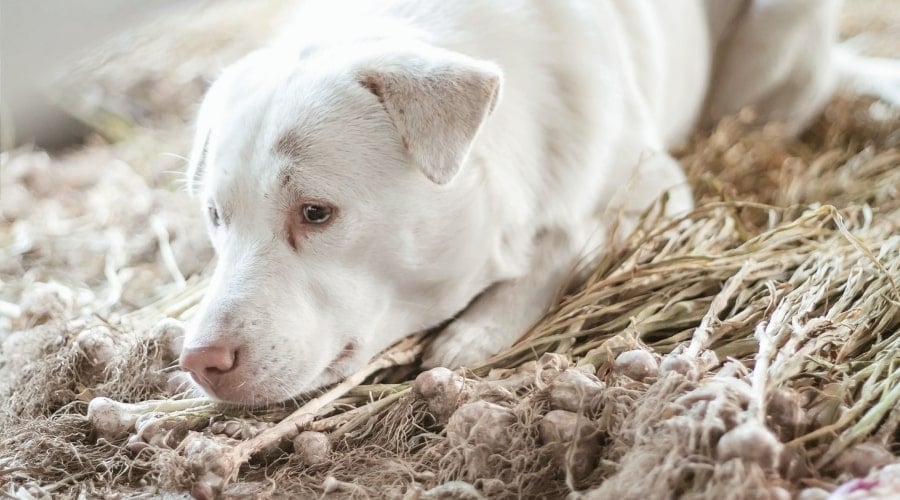
One of the allium family members, garlic, can cause issues with your dog’s red blood cells. It creates oxidative damage, which causes these cells to become fragile and break. This means there are fewer red blood cells in your dog’s circulation leading to anemia. Your dog may take a few days to develop symptoms but may show signs of weakness, pale gums, and elevated heart rate.
Do not allow your dog to eat garlic bulbs, crushed or dried garlic. Leftovers and products like garlic bread could also be harmful to your pet, so they are best avoided.
6. Grapefruit
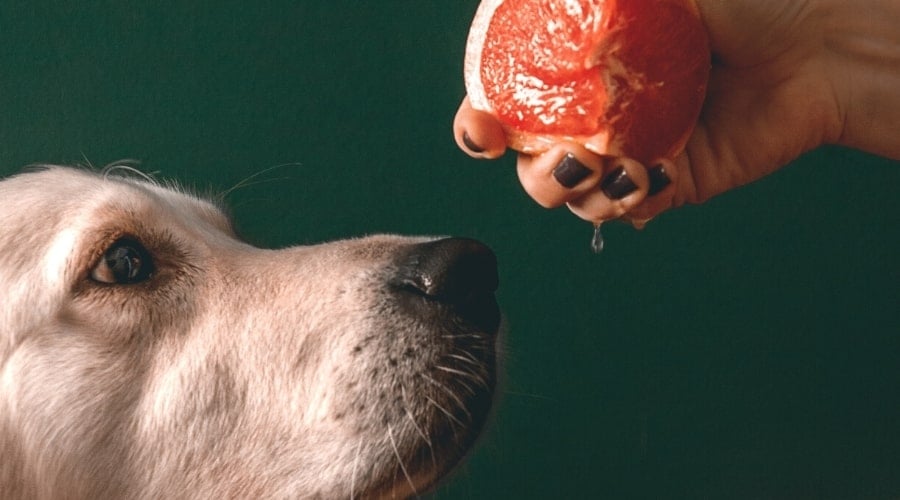
Grapefruit flesh itself is not toxic to dogs but is extremely acidic, which may cause tummy upsets. However, the peel, seeds, and plant can cause issues such as long-term gastrointestinal problems and possibly photosensitive dermatitis. Grapefruit is best avoided as a treat for your dog because of the potential risks. Also, many dogs won’t actually like the taste of it, so try something tastier instead.
7. Grapes
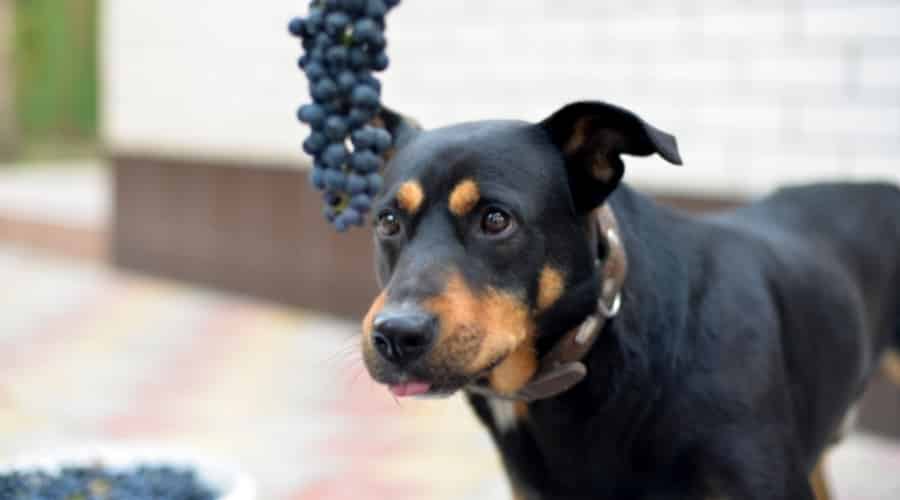
You should never give dogs grapes or raisins because of the risk associated with them. They can cause potentially fatal kidney failure. The exact mechanism of toxicity is unclear, so it is also hard to know exactly how many grapes will cause toxicity.
In some dogs, just a couple of grapes could cause problems, whereas, in other dogs, they can eat several with no issues at all. It is better not to take the risk and avoid giving grapes and raisins to your dog at all.
If your pet accidentally ingests raisins or grapes, you must call a veterinarian ASAP. This also includes products that contain grapes, like fruit cakes, fruit bagels, grape juice, and grape jelly.
8. Kale
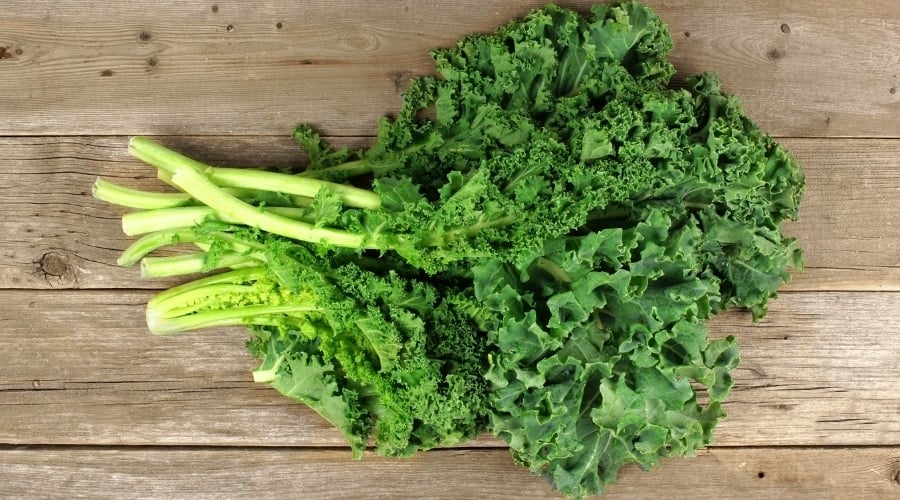
You should avoid giving your dog kale as it contains a couple of different compounds that can be harmful to dogs, including calcium oxalate and isothiocyanates. Calcium oxalate can cause issues, such as kidney and bladder stones, and isothiocyanates can cause gastrointestinal irritation leading to vomiting and diarrhea.
Thallium poisoning is also a rare possibility when eating kale due to the amounts of this heavy metal within the plant. While small quantities of kale may be ok, you should avoid giving too much of this vegetable because of the possible risks. Learn more about the best superfoods for dogs in our detailed guide.
9. Leeks
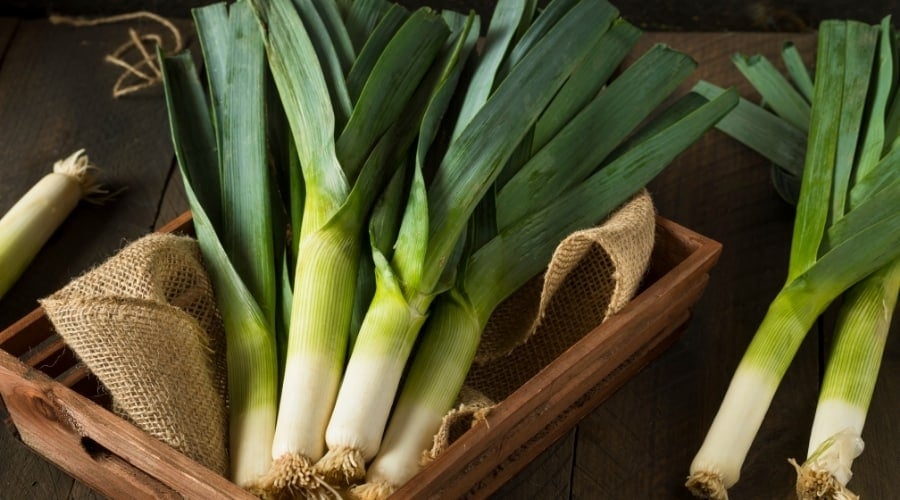
From the same allium family as garlic, leeks are another veggie that can cause hemolytic anemia in dogs. Oxidative damage occurs, destroying red blood cells (which carry oxygen around the body). With a reduced number of red blood cells, dogs become weak and pale. They may even collapse if severely anemic. You should avoid giving your dog leeks at all, either cooked or raw.
10. Lemon
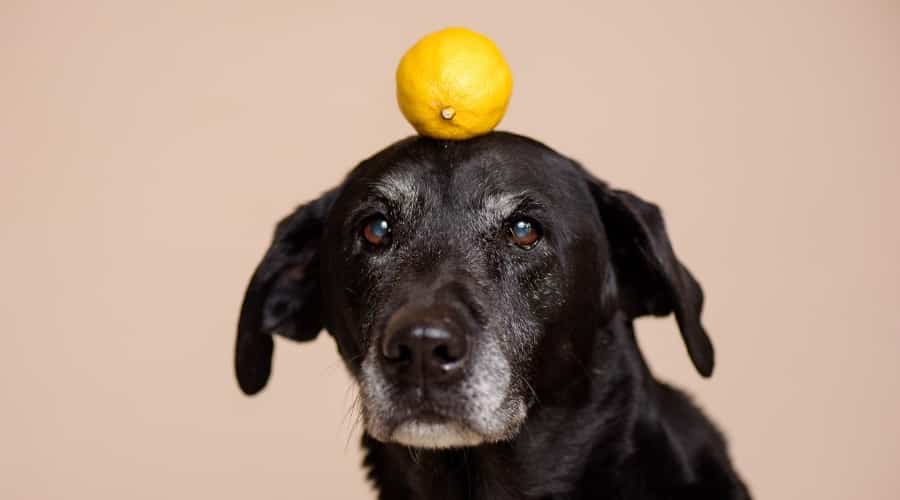
Dogs will usually avoid lemons because of their strong citrus flavor. However, some dogs will eat anything given half a chance. The flesh of lemons is non-toxic but eaten in large quantities could irritate a dog’s stomach and intestines.
The skin of the fruit, its seeds, and the tree on which it grows, however, contains some toxic compounds that can be harmful to dogs, including a phototoxic chemical called psoralens, plus some essential oils. Vomiting, diarrhea, lethargy, and potential skin issues could occur. There are far tastier fruits to offer your dog, so avoid any risk and don’t give lemons.
11. Lime
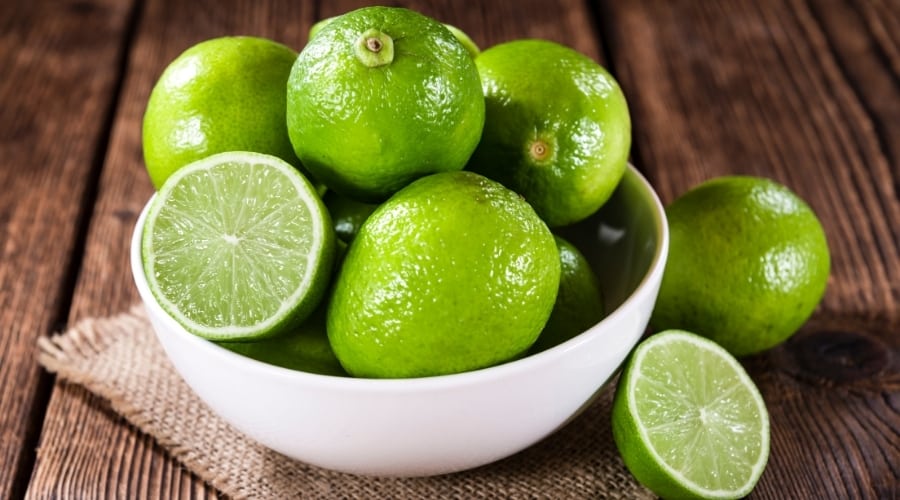
As a fellow citrus fruit, limes fall into a similar category as lemons. Lime trees produce the phototoxic chemical psoralens, as well as some essential oils. You should avoid giving your dog limes, as the skin, pips, and the tree itself is toxic, even though the flesh is safe. There are better-tasting and safer fruits to offer your dog than limes.
12. Mushrooms
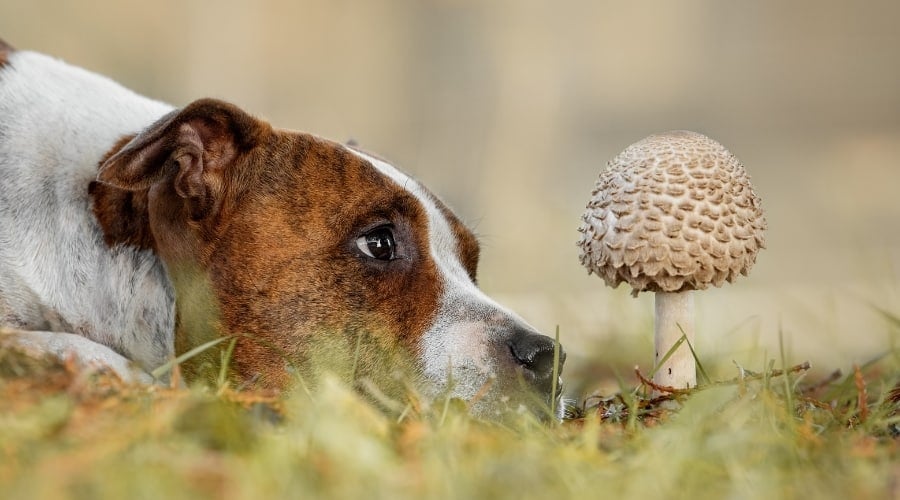
Although edible mushrooms that are safe for humans are usually fine for dogs to eat, many varieties of wild mushrooms could cause serious problems. Dogs could become confused if you give them mushrooms at home and may eat any they come across while out walking.
Mushroom poisoning symptoms vary considerably depending on the type of mushroom eaten. Common side effects include vomiting, diarrhea, lethargy, jaundice, abdominal pain, seizures, and coma. It is best to avoid mushrooms altogether to reduce the risk of any accidents.
13. Onion
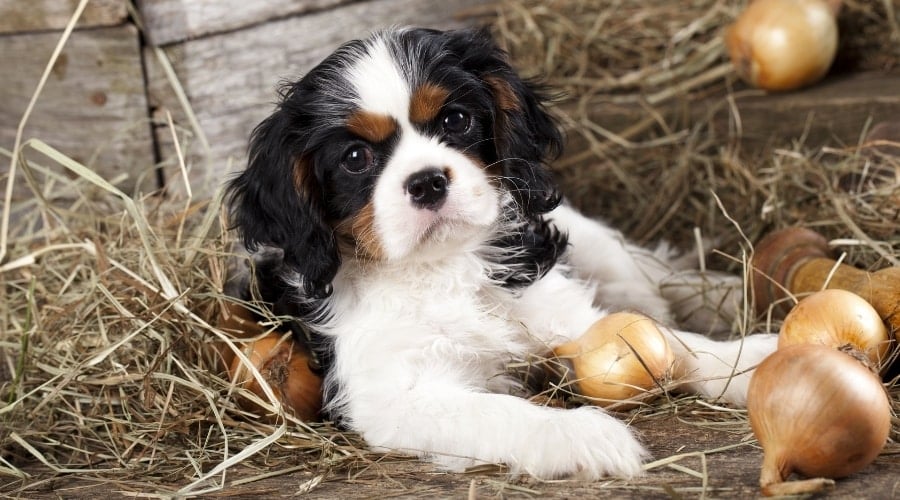
Onions are toxic to dogs and must be avoided. They are another member of the allium family, which can cause dangerous hemolytic anemia. The onions cause oxidative damage to dogs’ red blood cells, causing them to become fragile and burst. Reducing the number of healthy red blood cells in circulation can cause dogs to become pale, weak, and even collapse.
Symptoms can take a few days to develop, so even if your dog seems ok immediately after eating onions, you should still take them to a veterinarian. Toxicity occurs in both raw and cooked onions, so don’t give your dog any leftovers that could contain them.
14. Plum
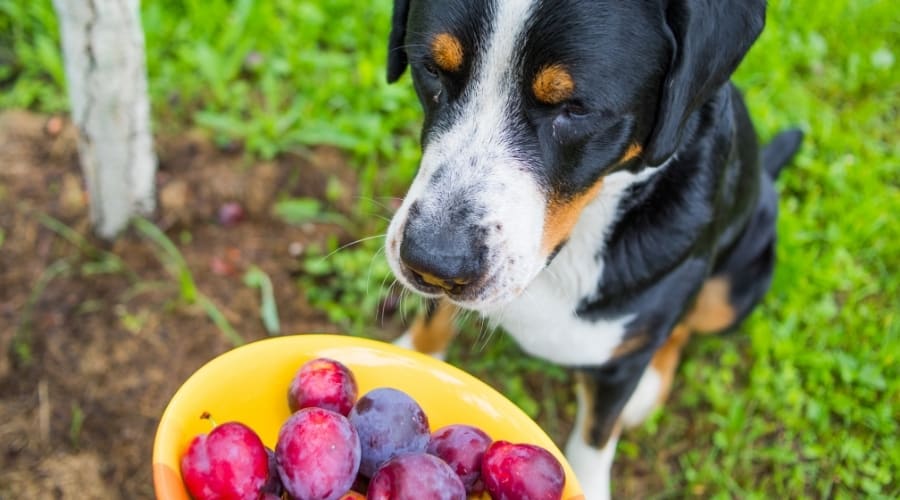
Plums have the potential to be toxic to dogs. The seeds and pits can contain cyanide, and as many dogs aren’t particularly dainty eaters, there’s a risk they may consume these as well as the flesh.
The stems and leaves also contain cyanide, so if you have a plum tree in your garden, you may want to make sure your dog doesn’t chew at it or eat any dropped plums. Cyanide toxicity can cause bright red gums, large dilated pupils, and breathing difficulties.
15. Raw Potatoes
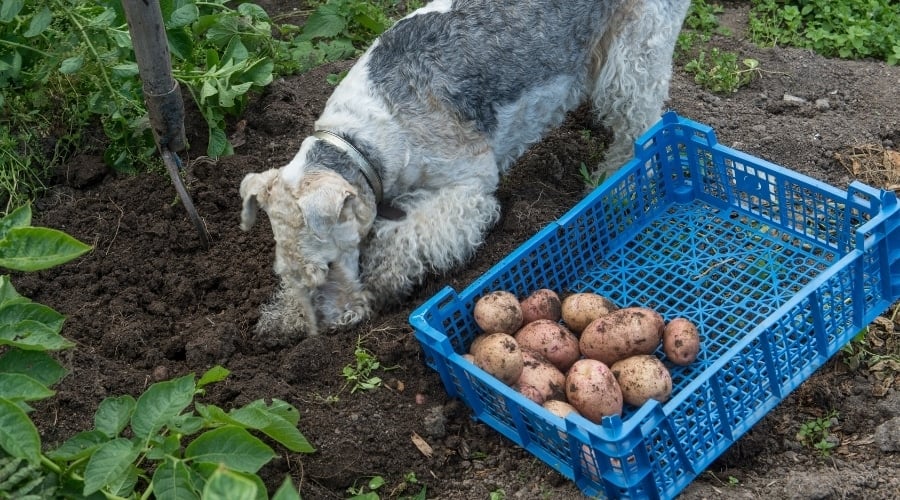
Uncooked potatoes contain solanine, which is a glycoalkaloid poison. Potatoes that are green or have sprouted will contain exceptionally high amounts of solanine, as does the plant the potatoes grow from.
You should never give your dog raw potatoes or potato peelings, as it could cause a slow heart rate, digestive upset (vomiting and diarrhea), and possible vision problems. Cooked potatoes, however, are ok to feed to dogs in small quantities as long as they are unseasoned.
16. Rhubarb
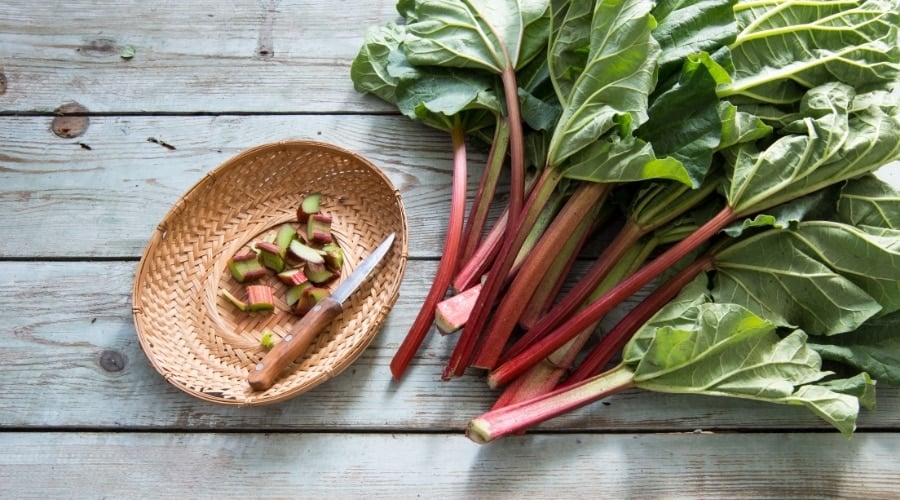
The rhubarb stems (the parts used in crumbles and pies) are not likely to be toxic to dogs, but the rhubarb plant itself is toxic. The leaves contain soluble oxalate crystals, which can cause a severe drop in your dog’s calcium levels. Symptoms of toxicity include drooling, vomiting, diarrhea, lethargy, tremors, and bloody urine. In some cases, kidney failure could occur, which is potentially fatal.
You shouldn’t give your dog rhubarb stalks even though they are safe, as it could encourage your dog to scavenge and eat the whole rhubarb plant if they come across it in the garden or growing in the wild.
17. Shallots
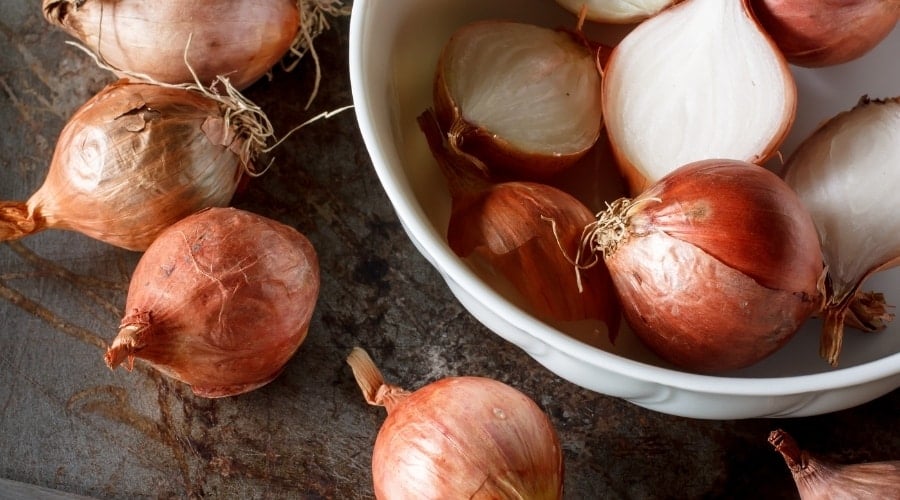
These small bulb-like plants are very closely related to onions. They also cause toxicity to dogs in the same way that onions do. They will cause damage to your dog’s red blood cells, regardless of whether they are eaten raw or cooked, so make sure you don’t feed them to your pet.
18. Spinach
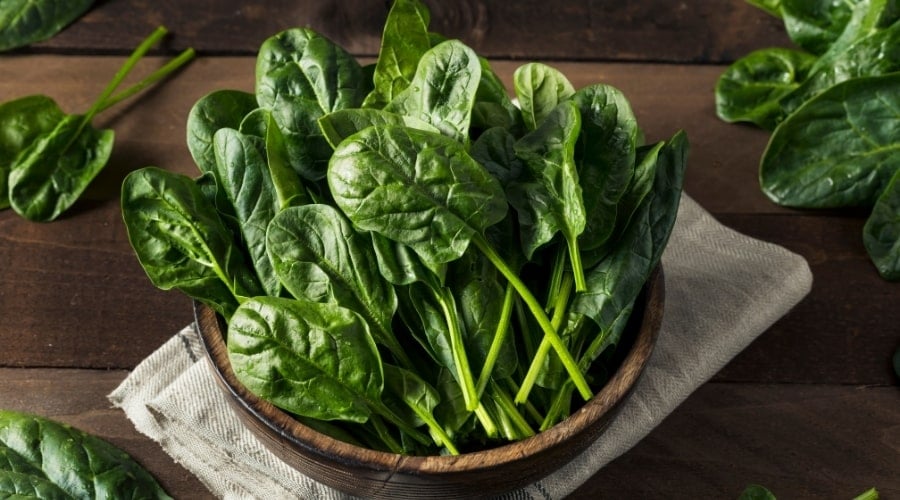
This vegetable is okay to eat in small quantities. However, when fed in high volumes, the large amounts of oxalic acid could prove harmful to your dog’s kidneys. So you shouldn’t feed this vegetable daily or in high volumes. As there are more safe vegetables to give, spinach is on our avoid list, but you could give it in small amounts if you wanted to.
19. Spring Onions (Green Onions)
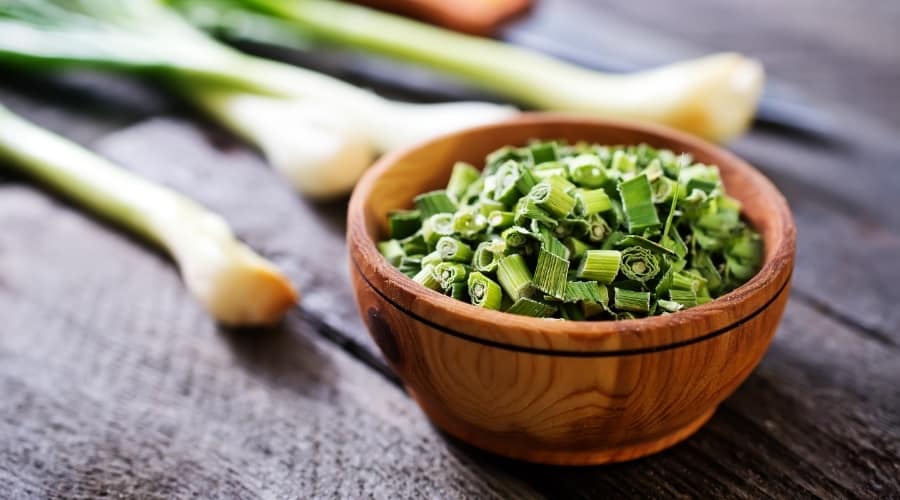
Another allium family member, spring onions (also known as green onions or scallions), are toxic to dogs. They have the same exact mechanism of action as onions and garlic, causing hemolytic anemia. The compounds in this vegetable cause oxidative damage to red blood cells, inducing them to burst. Dogs can become very unwell after eating spring onions, so avoid giving them.
20. Tomato
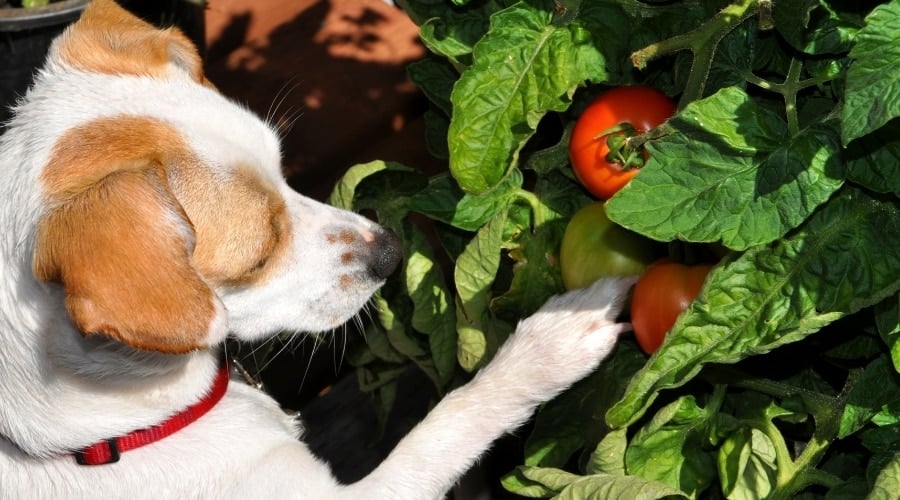
Tomatoes could cause problems in dogs. The ripened red fruit is usually safe, but green tomatoes and the plant itself contain solanine, a glycoalkaloid.
If eaten in very high volumes, this could potentially cause toxicity. This could cause digestive upset, lethargy, and weakness. Feeding tomatoes to your dog could encourage them to raid plants in your garden, which could mean they accidentally ingest unripe ones and plant material.
Keep In Mind
It’s recommended that veggies and fruits only ever make up around 10% of your dog’s daily diet. When it comes to introducing new foods to your pet, begin by only offering small amounts to verify there are no adverse reactions before offering more. Additionally, anytime you give a dog safe vegetables or fruit, ensure it’s not covered with any sauces or spices (these may contain items that are bad for your pup). Learn more about fruits dogs can safely eat in our detailed guide.
You should consider consulting a veterinarian, especially if your dog has individual dietary requirements such as diabetes or food allergies and sensitivities, in case feeding them extra snacks triggers any issues.
Consider Pet Insurance
While we do our best to keep our pups safe, there are unavoidable health emergencies that happen. In many cases, proactively signing up for health insurance for your dog can be a beneficial tool to help access more care. Learn more about pet insurance, what it covers, and whether it can help you if your dog ingests a toxic substance.
A Healthy Diet Means A Healthy Pup
A good-quality commercial diet provides your dogs with all the nutrition they require, so vegetables and fruits should be seen as just a little extra boost. Many of the nutrients humans rely on from plants, such as vitamin C, dogs don’t actually require in the same way. Fortunately, there are several high-quality options for dog food. If you like the idea of fresh fruits and veggies, check out The Farmer’s Dog, Ollie, and Maev (frozen raw food). Or, if your dog likes dry food better, you can try Spot & Tango’s UnKibble.
And lastly, don’t forget, if your dog consumes any of the toxic vegetables on our list, you must call your veterinarian immediately as your dog could require urgent treatment.
Why Trust Canine Journal?
Dr. Rebecca MacMillan, VetMed MRCVS, is a companion animal veterinarian and surgeon who works in the South West of England. She graduated from England’s Royal Veterinary College and now has over 15 years of clinical experience. Dr. MacMillan treats dogs for routine visits, medical cases, and emergencies. She is also a dedicated dog mom to her Flat-Coated Retriever, George.
